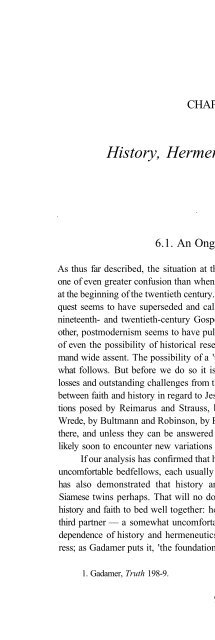Jesus Remembered: Christianity in the Making, vol. 1
Jesus Remembered: Christianity in the Making, vol. 1 Jesus Remembered: Christianity in the Making, vol. 1
CHAPTER 6 History, Hermeneutics and Faith 6.1. An Ongoing Dialogue As thus far described, the situation at the beginning of the twenty-first century is one of even greater confusion than when Schweitzer surveyed the equivalent scene at the beginning of the twentieth century. On the one hand, the rampant neo-Liberal quest seems to have superseded and called in question some of the key results of nineteenth- and twentieth-century Gospels and life of Jesus research. And on the other, postmodernism seems to have pulled the rug completely from under the feet of even the possibility of historical research producing results which could command wide assent. The possibility of a 'third quest' is one I shall pursue further in what follows. But before we do so it is advisable to take stock of the gains and losses and outstanding challenges from the more than five hundred years of tension between faith and history in regard to Jesus of Nazareth so far reviewed. The questions posed by Reimarus and Strauss, by Lessing and Troeltsch, by Kahler and Wrede, by Bultmann and Robinson, by Funk and Crossan, by Iser and Fish are still there, and unless they can be answered satisfactorily at this point any progress is likely soon to encounter new variations of the same old roadblocks as before. If our analysis has confirmed that history (the discipline) and faith have made uncomfortable bedfellows, each usually trying to push the other out of the bed, it has also demonstrated that history and hermeneutics are close companions, Siamese twins perhaps. That will no doubt be part of the reason for the failure of history and faith to bed well together: hermeneutics is the too little acknowledged third partner — a somewhat uncomfortable menage ä trois. But unless the interdependence of history and hermeneutics is acknowledged, there can be no progress; as Gadamer puts it, 'the foundation for the study of history is hermeneutics'. 1 1. Gadamer, Truth 198-9. 99
- Page 184: FAITH AND THE HISTORICAL JESUS §5.
- Page 188: FAITH AND THE HISTORICAL JESUS §5.
- Page 192: FAITH AND THE HISTORICAL JESUS §5.
- Page 196: FAITH AND THE HISTORICAL JESUS §5.
- Page 200: FAITH AND THE HISTORICAL JESUS §5.
- Page 204: FAITH AND THE HISTORICAL JESUS §5.
- Page 208: FAITH AND THE HISTORICAL JESUS §5.
- Page 212: FAITH AND THE HISTORICAL JESUS §5.
- Page 216: FAITH AND THE HISTORICAL JESUS §5.
- Page 220: FAITH AND THE HISTORICAL JESUS §5.
- Page 224: FAITH AND THE HISTORICAL JESUS §5.
- Page 228: FAITH AND THE HISTORICAL JESUS §5.
- Page 232: FAITH AND THE HISTORICAL JESUS §5.
- Page 240: FAITH AND THE HISTORICAL JESUS §6.
- Page 244: FAITH AND THE HISTORICAL JESUS §6.
- Page 248: FAITH AND THE HISTORICAL JESUS §6.
- Page 252: FAITH AND THE HISTORICAL JESUS §6.
- Page 256: FAITH AND THE HISTORICAL JESUS §6.
- Page 260: e. 'Critical Realism' FAITH AND THE
- Page 264: FAITH AND THE HISTORICAL JESUS §6.
- Page 268: FAITH AND THE HISTORICAL JESUS §6.
- Page 272: FAITH AND THE HISTORICAL JESUS §6.
- Page 276: FAITH AND THE HISTORICAL JESUS §6.
- Page 280: FAITH AND THE HISTORICAL JESUS §6.
- Page 284: FAITH AND THE HISTORICAL JESUS §6.
CHAPTER 6<br />
History, Hermeneutics and Faith<br />
6.1. An Ongo<strong>in</strong>g Dialogue<br />
As thus far described, <strong>the</strong> situation at <strong>the</strong> beg<strong>in</strong>n<strong>in</strong>g of <strong>the</strong> twenty-first century is<br />
one of even greater confusion than when Schweitzer surveyed <strong>the</strong> equivalent scene<br />
at <strong>the</strong> beg<strong>in</strong>n<strong>in</strong>g of <strong>the</strong> twentieth century. On <strong>the</strong> one hand, <strong>the</strong> rampant neo-Liberal<br />
quest seems to have superseded and called <strong>in</strong> question some of <strong>the</strong> key results of<br />
n<strong>in</strong>eteenth- and twentieth-century Gospels and life of <strong>Jesus</strong> research. And on <strong>the</strong><br />
o<strong>the</strong>r, postmodernism seems to have pulled <strong>the</strong> rug completely from under <strong>the</strong> feet<br />
of even <strong>the</strong> possibility of historical research produc<strong>in</strong>g results which could command<br />
wide assent. The possibility of a 'third quest' is one I shall pursue fur<strong>the</strong>r <strong>in</strong><br />
what follows. But before we do so it is advisable to take stock of <strong>the</strong> ga<strong>in</strong>s and<br />
losses and outstand<strong>in</strong>g challenges from <strong>the</strong> more than five hundred years of tension<br />
between faith and history <strong>in</strong> regard to <strong>Jesus</strong> of Nazareth so far reviewed. The questions<br />
posed by Reimarus and Strauss, by Less<strong>in</strong>g and Troeltsch, by Kahler and<br />
Wrede, by Bultmann and Rob<strong>in</strong>son, by Funk and Crossan, by Iser and Fish are still<br />
<strong>the</strong>re, and unless <strong>the</strong>y can be answered satisfactorily at this po<strong>in</strong>t any progress is<br />
likely soon to encounter new variations of <strong>the</strong> same old roadblocks as before.<br />
If our analysis has confirmed that history (<strong>the</strong> discipl<strong>in</strong>e) and faith have made<br />
uncomfortable bedfellows, each usually try<strong>in</strong>g to push <strong>the</strong> o<strong>the</strong>r out of <strong>the</strong> bed, it<br />
has also demonstrated that history and hermeneutics are close companions,<br />
Siamese tw<strong>in</strong>s perhaps. That will no doubt be part of <strong>the</strong> reason for <strong>the</strong> failure of<br />
history and faith to bed well toge<strong>the</strong>r: hermeneutics is <strong>the</strong> too little acknowledged<br />
third partner — a somewhat uncomfortable menage ä trois. But unless <strong>the</strong> <strong>in</strong>terdependence<br />
of history and hermeneutics is acknowledged, <strong>the</strong>re can be no progress;<br />
as Gadamer puts it, '<strong>the</strong> foundation for <strong>the</strong> study of history is hermeneutics'. 1<br />
1. Gadamer, Truth 198-9.<br />
99



